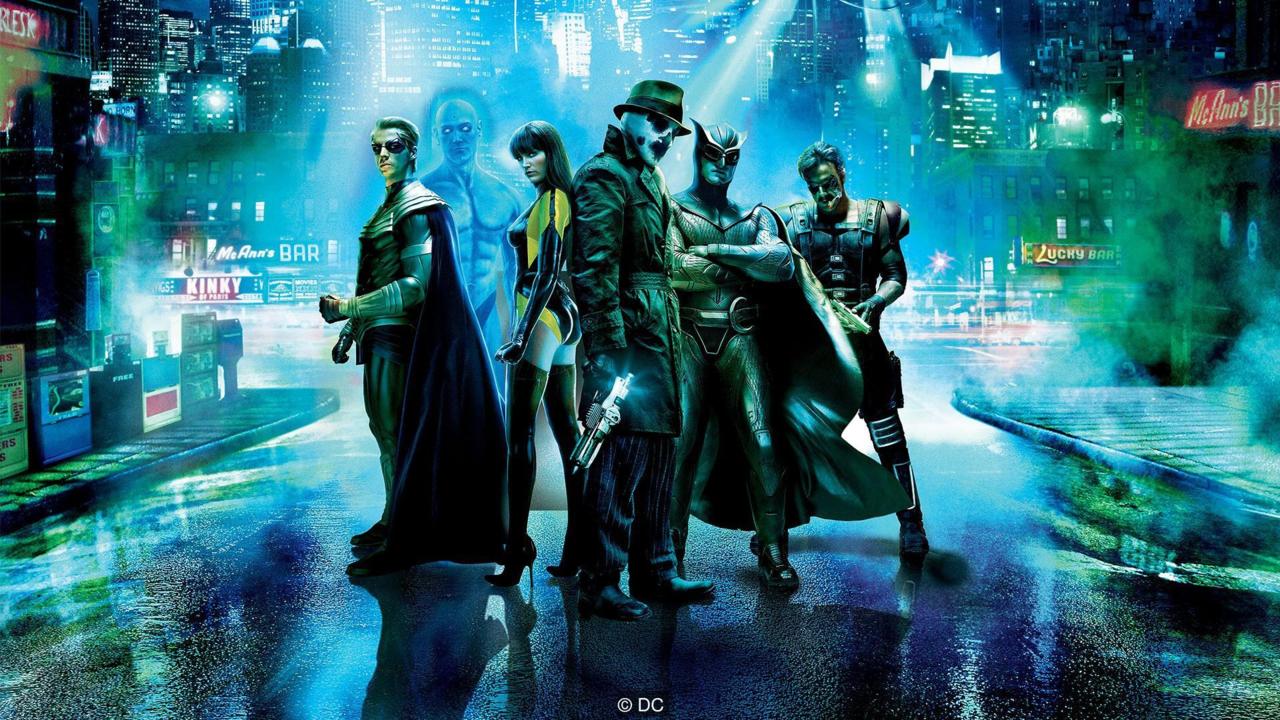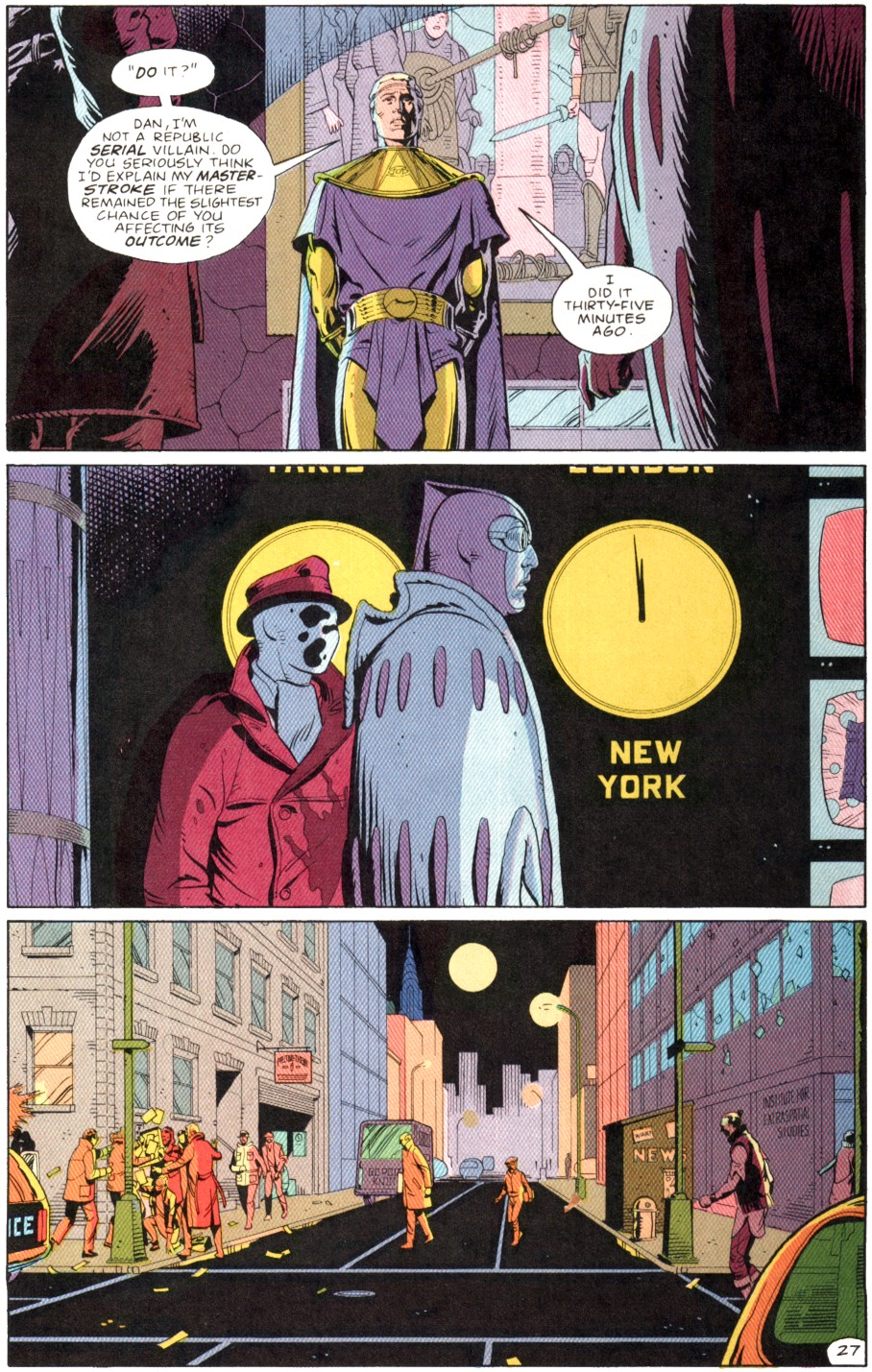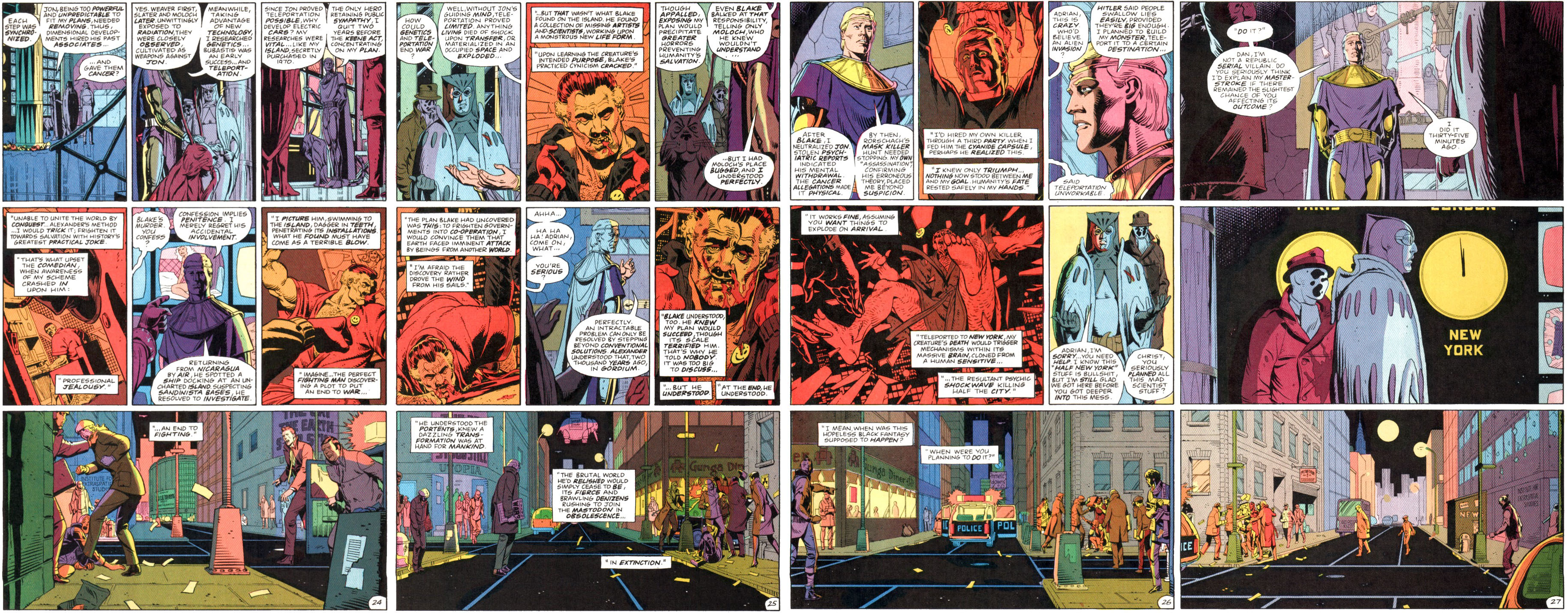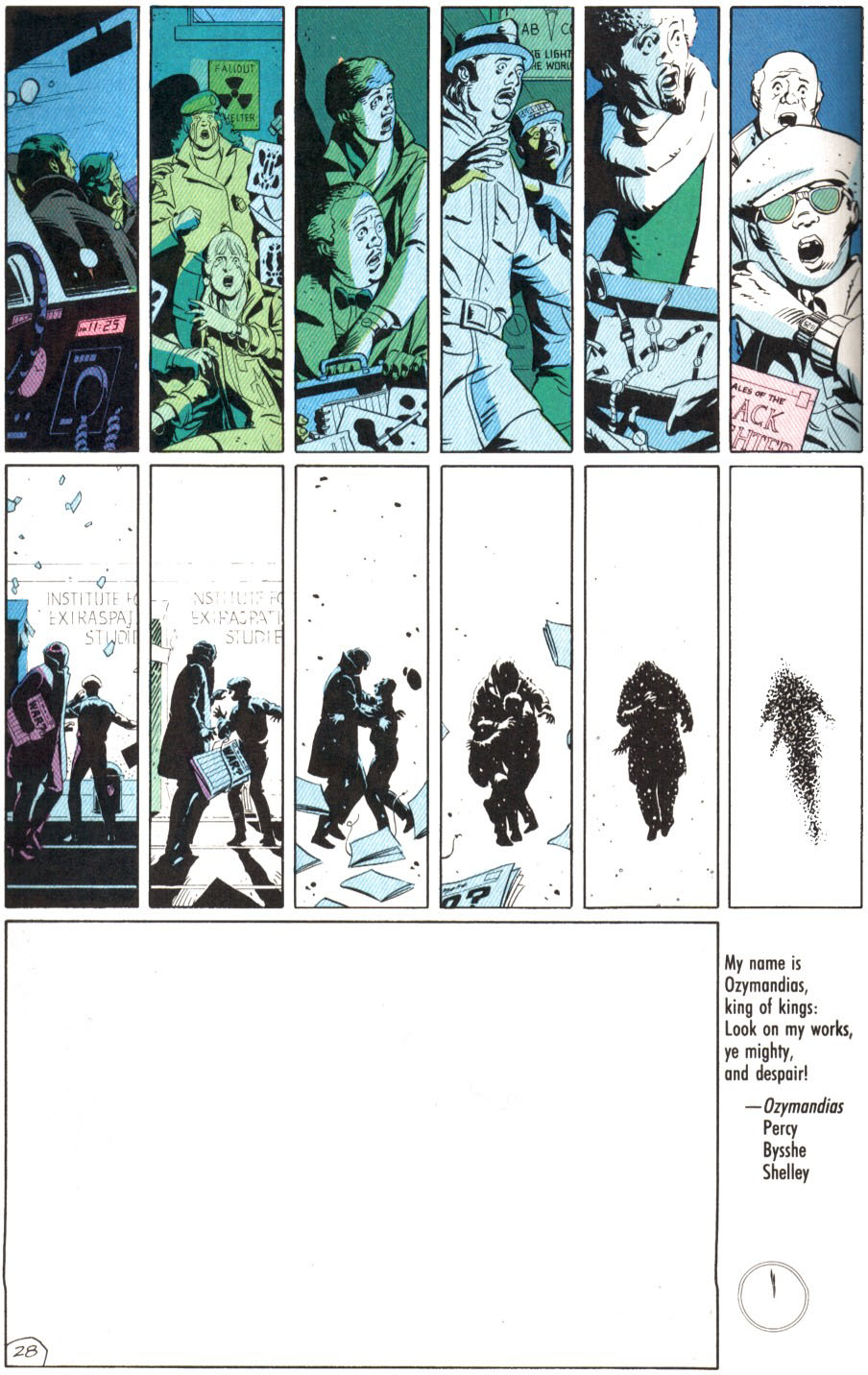I really enjoyed Zach Snyder’s Watchmen movie. I felt that, despite the limitations of its form and the flaws in its creation, it still managed to capture many of the things that were amazing about the original work. (And the opening tableau is jaw-droppingly awesome.)
But he totally prat-falled when it came to the ending.
“I did it thirty-five minutes ago.”
First, the plan from the original story shifts from framing aliens humans will never find but would be able to at least hypothetically defend themselves against (as evidenced by the fact they just made a mistake in their invasion plans) to framing a guy who humans absolutely, positively cannot defend themselves against (as demonstrated by the fact he just casually destroyed two major cities) and who is going to live on Mars. This fundamentally changes the tone of the plan from “humanity will come together to face a common foe” to “humanity will behave itself or the angry god will come back to punish us”.
More importantly, Snyder screws up the execution. What makes the line haunting in the comic book is that you linger in a moment of stillness and silence; the reader basically joined Rorschach and Nite-Owl standing in a stunned silence as the horrible implications of that simple, casually spoken statement. (I’ve also always read the line as being delivered the same way someone might say, “I picked up the groceries today.” But I recognize that that’s idiosyncratic.)
Snyder doesn’t give you that moment. He doesn’t let the meaning of the words settle over you. He doesn’t give your imagination a moment to catch up to the rest of your brain and go, “HOLY SHIT!” Instead he:
- Cuts away from Ozymandias just before he says the line to a reaction shot of Rorschach and Nite-Owl.
- Has the camera in motion.
- Has the score rise to a crescendo.
- Hard cuts away from the line to immediately show what happened 35 minutes ago.
The entire effect is to anticipate (and thus undercut) the line; and then place the emphasis on the action to follow instead of the line itself.
All of that, by itself, would completely ruin the effectiveness of the line. (Which is why you never see anybody quoting the line who hasn’t read it in the comic book: In the movie, it’s simply not quotable.)
He also rewrites the line. The first of these (changing “Republic serial villain” to “comic book villain”) is largely irrelevant to the current discussion (although it does needlessly remove nuance; one of the major points in Watchmen is that in a world where superheroes actually exist, they aren’t perfect heroes — it isn’t the Marvel universe where the Marvel comics are actually published; it’s a universe where superhero comics didn’t exist). But the crucial change is from:
- “I did it thirty-five minutes ago.”
to:
- “I triggered it thirty-five minutes ago.”
And the semantic shift, though subtle, is not insignificant. If you trigger something, you have set it in motion (which inherently means you could still stop it). If you did something, on the other hand, then it’s done. This, too, effectively undercuts the ability for the finality of the line to land.
If I was teaching a class in film editing, I would cue this up along with the special editions of the Star Wars movies as examples of how subtle the difference in editing is between a great film and a mediocre one.
It actually reminds me of the story told by the scriptwriters for Casablanca. That film was infamously being rewritten basically up until the last day of shooting, and they had just written the famous ending to the film the day before it was filmed. (“Round up the usual suspects.”) So the director films it, it gets edited, and then they call the writers to tell them that the ending isn’t working. So the writers head over to the studio and they discover that they’re basically trying to do it in one take, “Major Strasser has been shot.” (looks at Rick) “Round up the usual suspects.”
And the writers say, “No, no, no. You have to say, ‘Major Strasser has been shot.’ And then cut to Rick. And then cut to Renault. And then cut to Rick. And then cut back for, ‘Round up the usual suspects.'” You have to see the thought. And so they recut the scene and, of course, it’s a classic.
THE SOUND OF SILENCE
Since I’m talking about this, I’d also like to delve a little deeper into what makes the original Moore/Gibbons storytelling in this moment so utterly compelling.
Look at the composition of the full page:
It consists of three panels, each taking up the full width of the page. (You can click any of these images to see them at a larger size.)
The first panel, of course, contains the definitive quote. The fact that it takes up a full page width causes the perceived moment to extend in the reader’s mind.
The second panel is a completely silent reaction shot of Rorschach and Nite Owl. Their faces are completely blank in shock; like they’ve been hit in the face with a two-by-four. Notably, the panel is framed to show a bank of clocks in the background. The current time in New York is shown as being one minute to midnight: Which is where the Doomsday Clock has been for the entire comic. Snyder tries to do the same thing, but (a) puts the reaction shot before the revelation and (b) makes the metaphor literal by showing the actual countdown clocks of the operation at 00:00 (which also means he cuts away from the moment).
The third panel shows a street in New York. Utterly silent. It is, in fact, the fourth page in a row which has the final, page-wide panel depict that New York street:
The previous instances had Ozymandias talking over them in captions; but this one does not — it further extends the moment of silence that persists in that room between Ozymandias, Rorschach, and Nite Owl. And it simultaneously reveals that all those shots of New York you were seeing were, in fact, in the past… which inevitably leads you to imagine the destruction which is about to happen.
And then you turn the page and there it is. But you still don’t actually see a giant explosion. You see people react to it. And then you see them vaporized by it:
It’s absolutely brilliant visual storytelling in every single way.
Snyder, of course, goes for the disaster porn instead.
















There’s another reason that the line failed in the movie: in the comic, Ozymandias has just explained his entire plan in detail, when Nite Owl asks, “When were you planning to do it?” For the reader, there’s no doubt as to what “it” actually is.
In the movie, Ozymandias did not actually reveal his plan, but only gave vague hints and allusions that merely confirm he’s the antagonist, responsible for the previous events in the film. It’s the scenes following the line that fill in the details and make it clear what the goal was, and by then it’s too late for the line to have had its full impact.
Thanks for this – stirred up some great memories.
My reading of the comic wasn’t that the aliens were invading… the setup made people think the one that appeared in New York came from some other dimension, and had somehow fallen through to ours due to something happening at the Institute for Dimensional Studies. It was knowing that there were actually aliens out there who might come through that caused the ceasing of warfare and thoughts of unity, not specific knowledge that they were planning to invade us.
Also, you start discussing Ozymandius’ line in your 4th paragraph without mentioning which line you were talking about. I assumed it was “I did it half an hour ago” (and turned out to be right), but did you mean to introduce the line before you got to the discussion of it?
One thing I love about that explosion page is how, in his final moments, the newspaper seller tries to protect the boy. I haven’t seen the film since it came out, so I don’t remember if Snyder included that bit. Probably not.
I was surprised that the bit where Rorschach is executed, that overhead shot of his bloodied corpse that evokes the smeared smiley face, wasn’t in the original book, because it seemed like something that should have been. Well done to whoever came up with that.
I’m of the mind that Zack Snyder can’t do big story transitions. Someone made the argument that he -can- direct by comparing the explosions in BvS vs CA:CW. Civil War just has a building blowing up, but Snyder is able to construct a flowing mini-story that grows in nature with his explosions. Snyder’s problem is that he can’t pin the big stuff together, as he is trying to sew all these cool looking visuals together.
Case in point. I -hate- the switchover from (fictional) aliens to framing Dr Manhattan because it neuters the ending. Snyder kept the ending of the Watchmen, where a publisher is reaching for a random item out of their “crank” pile, and it is shown that it might possibly be Rorscharch’s journal. In the comic, this shows that Ozymandius plan is not as solid as he believes, that the doomsday clock is closer than he realizes, as the truth of what he has done can come forth and unravel everything.
But in the movie, if the truth comes out, so what? Dr. Manhattan has -agreed- to go along with Ozymandius plan. Even if it comes out that Ozymandius actually performed the deed, the threat of Dr. Manhattan does not go away. People are still in thrall of their new, blue, naked, angry god.
Re: The comparison of explosions. I’ve seen that video. They make a decent case of Zack Snyder’s editing of that specific scene being good storytelling.
Where I disagree with it is the critique of the CA:CW explosion. Yes, it’s true that the Vienna explosion in CA:CW doesn’t tell the story of the explosion’s effects rippling out into the wider world… but that’s because that’s not the story it’s trying to tell. The story it’s telling is about how T’challa is personally affected by the death of his father and is helpless to save him.
(Tangential point, really. But it bugged me when I saw that video.)
I just stumbled across this by accident and I wanted to say thank you! You managed to perfectly put into words what my big problem with the Watchmen film was. I really, really dislike the way that movie ended (along with a lot of other stuff actually, but mostly that :D)
It is a real pity that you weren’t consulted before the movie was made, Justin.
I always hated the ending of the comic. They’ve set up a world where the only supernatural element is Dr. Manhattan… And then in the 11th hour reveal, “Oh yeah, forgot to tell you, but psychics are also real, and not only that, their powers are strong enough to kill people!” This seems like a major worldbuilding detail that the reader ought to be let in on before it becomes a major plot point. But the only mention of psychics before the big reveal was a newspaper clipping about some dead medium’s head being stolen, and even then we’re left to think he was just some charlatan. There was no indication that psychic powers were actually real.
Adrian using Dr. Manhattan as his scapegoat has narrative problems as you point out, but at least his existence doesn’t come completely out of nowhere.
Man, thank you SO much for this article. I’ve been ranting for years to anyone who’d listen about the tone shift from “face a common foe” to “fear an angry god,” and NOBODY gets it. This was awesome to read.